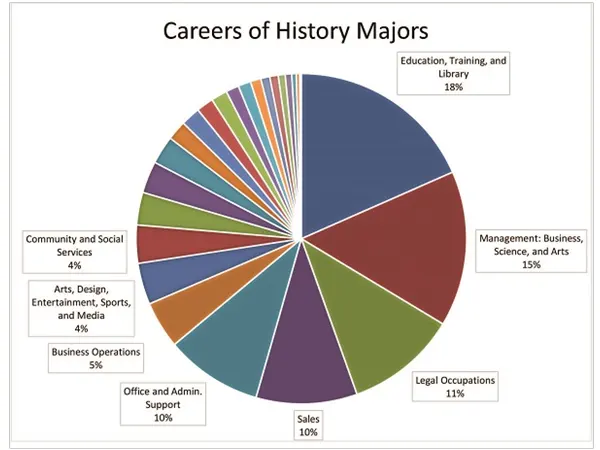
Are you a history enthusiast, who often wonders about some long-dead civilization or just looks forward to taking inspiration from some forgotten heroes?
If yes, then studying history might interest you in mastering some transferable skills while learning about the different systems, ideologies, state machinery, and cultures that exist or exist.
History opens the doors for you to understand, how far we have come along with what values and practices should we uphold and what to avoid.
So, if you have a lifelong obsession with history, here are 7 career paths you may consider as a history graduate.

1. Historian
A historian’s job is to study and analyze the past, and then communicate it in their own wordings. They often gather their first-hand information from a range of sources, such as extensively analyzing all the previous writings, interpreting the physical artifacts, and other evidence, relating to the subject
They also tend to play a crucial role in interpreting past events and making them relevant for the future. This adds up to their significance in understanding different cultures and societies.
Historians are often employed in a range of settings, such as museums, libraries, government agencies, educational institutions, and many more. Here are some of the key responsibilities of a historian:
- Gather historical evidence from a range of sources such as archives, books, artifacts, etc.
- Carefully analyze and interpret the authenticity of the historical information.
- Trace all the recent historical developments in the particular field.
- And, effectively communicate their learnings to the public through different channels such as publishing their writings, participating in educational programs, and attending presentations.

2. Academic Researcher
As the name suggests, the job of an academic researcher is to apply all of their gathered skills and expertise in gathering information about some specific topic from the history.
Academic researchers are typically BA history, PhD students, or some college lecturers. They work both independently or within an organization to analyze the historical events that support their current objectives and business goals.
These research analysts often spend their major time in planning research and communicating their understanding with their colleagues and other contributing members. And, they work in a variety of settings such as universities, research agencies, and governmental offices. Here are some key responsibilities of an academic researcher.
- Analyze a large set of information to draw some fact-based conclusions.
- Develop the plans and objectives regarding further research. This may include managing funds and collecting source information.
- Prepare high-quality presentations to teach undergraduate and postgraduate students.
3. Teacher or Professor
If you have some strong leadership skills, becoming a history teacher might be the perfect consideration for you. This is an exciting career path that allows you to guide others on the right path
History teachers are often required to teach a pre-determined curriculum to the students, while sharing their own wisdom and values to help students excel in literally every field of their lives. Here are the key responsibilities of a history teacher:
- Cover all the pre-determined curriculum, while maintaining up-to-date subject knowledge.
- Maintain the progress reports of the students and give appropriate feedback.
- Prepare their students for all the academic and personal difficulties.
4. Archivist
An archivist’s job is to preserve information and make it accessible to a wider audience through a range of devices, such as university speeches, published works, or even through online channels like websites and emails.
This critical information might include research papers, historical books, maps, photographs, videos, etc. Here are some of the key responsibilities of an archivist
- Analyze different informational sources and work towards their preservation and retention.
- Manage all the fragile historical evidence and work on their repairing and conservation process.
- And, identify different ways to preserve and transfer archive materials.
5. Museum Curator
Museum curators work towards managing the artifacts and other artworks. This includes carrying out acquisition deals and carefully displaying the items for the purpose of educating the visitors. Here are some of the key responsibilities of a museum curator.
- Plan and organize all the museum exhibitions and lectures.
- Display the museum items in a way that is informative yet engaging to the general audience.
- And, handle the queries from the clients, stakeholders, and guest audience.
6. Cultural Resource Manager
Cultural resource management (CRM) is the practice of managing heritage assets and other cultural resources. The primary job of a cultural resource manager is to manage both physical assets such as architecture, paintings, and sculptures or also some non-physical assets such as folklore and other cultural practices. Here are some key responsibilities of a cultural resource manager.
- Working toward preserving and extensively performing the traditional forms of culture.
- And, encompassing the current cultural practices.
7. Historical Consultant
A historical consultant is someone who helps in conducting research and verifying pre-existing information. They are usually hired when companies require a historical fact check, and they don’t have time to do their own research. Here are some key responsibilities of a historical consultant.
- Conducting some thorough research regarding a historical document, building, artifact, or culture.
- Carefully draft the historical reports to advocate the historical values to companies or even filmmakers.
- And, supervising movies and TV shows in regard to a historical setting.
To Put it All Together
In closing, studying history can be a lucrative career option that can help you gain both transferable skills and cultural awareness. The skills and experience gained during a history degree can be used in a range of industries such as universities, museums, and other historical institutions, opening a diverse career path for history enthusiasts.